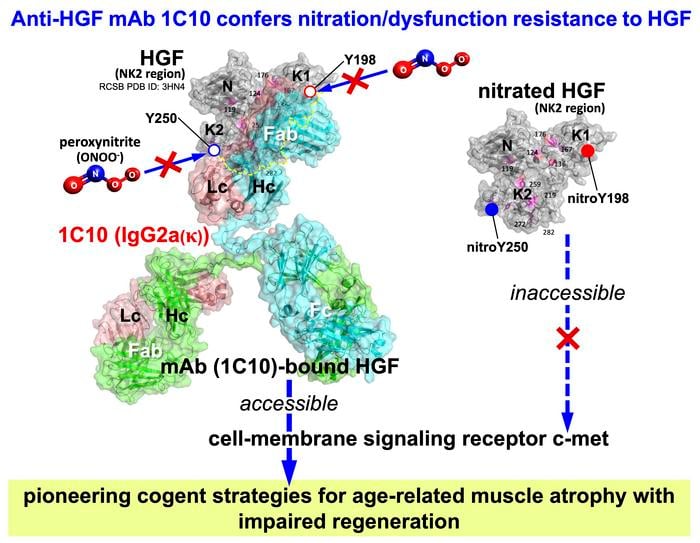Scientists at Kyushu University have engineered an innovative antibody that prevents the age-related dysfunction of hepatocyte growth factor (HGF), a key protein in muscle repair. Their findings could pave the way for future treatments targeting muscle degeneration and other age-related conditions.
Published in Aging Cell | Estimated reading time: 7 minutes
Understanding Muscle Degeneration in Aging
As people age, muscle mass and strength naturally decline, a condition known as sarcopenia. This loss of muscle function significantly reduces mobility and quality of life, particularly in super-aging societies such as Japan. Researchers have long sought methods to slow or reverse this decline, but understanding the underlying biological mechanisms has been a challenge.
A critical factor in muscle repair is hepatocyte growth factor (HGF), a protein that activates satellite cells—the stem cells responsible for regenerating damaged muscle tissue. When muscles are injured or stressed, satellite cells are activated by HGF to produce new muscle fibers. However, with age, HGF’s ability to function diminishes due to nitration, a chemical modification that alters the protein’s structure and activity.
Breakthrough in Antibody Research
Nitration occurs when nitrogen dioxide molecules attach to specific amino acids, such as the tyrosine residues Y198 and Y250 in HGF. This modification reduces HGF’s ability to bind to its receptor, c-Met, impairing its activation of satellite cells. Recognizing the significance of this process, researchers at Kyushu University developed a monoclonal antibody, 1H41C10, to block nitration and preserve HGF’s function.
“HGF loses its physiological activity when it becomes nitrated, and this phenomenon accumulates with age,” explained Professor Ryuichi Tatsumi, the study’s lead author. Using rat muscle cell cultures, the team designed and tested antibodies that specifically bind to the nitration sites on HGF. Of the candidates, 1H41C10 showed the most promise, protecting both Y198 and Y250 while preserving HGF’s natural ability to activate satellite cells.
Importantly, the antibody does not interfere with HGF’s normal biological activity. This makes it a strong candidate for therapeutic use, as it targets the root cause of age-related muscle atrophy without disrupting the protein’s beneficial effects.
Future Implications and Applications
While this research is still in its early stages, the implications are significant. Age-related muscle atrophy, including conditions such as sarcopenia and frailty, could be treated by therapies that maintain HGF’s function. Moreover, HGF plays a role in other tissues and organs, suggesting that this approach might extend to other age-related diseases or conditions involving tissue repair.
The team is optimistic about the broader applications of their findings. “With further research, we may be able to find other therapeutic applications of HGF in other pathologies,” Tatsumi noted. Potential areas for exploration include regenerative medicine for organs such as the liver or kidneys, where HGF also plays a crucial role in tissue repair.
Of course, clinical trials will be necessary to determine the safety and effectiveness of 1H41C10 in humans. However, this research marks an exciting step toward targeted therapies that could improve quality of life for aging populations worldwide.
Glossary
- Hepatocyte Growth Factor (HGF): A protein crucial for muscle development and repair, activating satellite cells to regenerate muscle tissue.
- Nitration: A chemical process where a nitrogen dioxide molecule attaches to a protein, often impairing its function.
- Satellite Cells: Stem cells in muscles responsible for repair and regeneration after injury or stress.
- Monoclonal Antibody: A lab-engineered molecule designed to bind to specific proteins and block harmful processes.
- Sarcopenia: The age-related loss of muscle mass and strength.
Quiz
What is the function of hepatocyte growth factor (HGF)?
Answer: HGF activates satellite cells to repair and regenerate muscle tissue.
How does nitration affect HGF?
Answer: Nitration modifies specific tyrosine residues in HGF, impairing its ability to bind to its receptor and activate satellite cells.
What makes the 1H41C10 antibody unique?
Answer: It binds to HGF and prevents nitration at two key sites, preserving the protein’s function.
In which journal was this study published?
Answer: Aging Cell.
Enjoy this story? Subscribe to our newsletter at scienceblog.substack.com.


